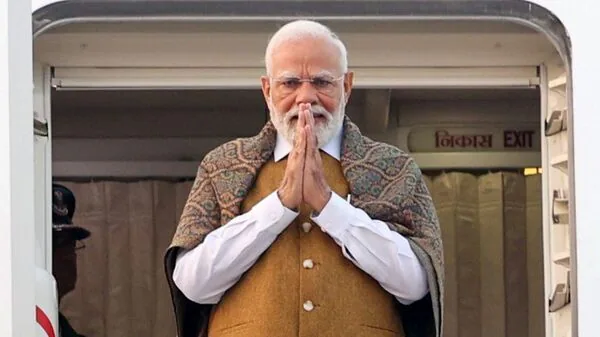
PM Modi Hails 'Progressive Labour-Oriented Reforms' As Govt Notifies 4 New Labour Codes
The four codes-the Code on Wages (2019), Industrial Relations Code (2020), Code on Social Security (2020), and Occupational Safety, Health and Working Conditions Code (2020)-came into effect on Friday, replacing 29 scattered laws with a single, modernised framework.
Here's what PM Modi saidThese Codes, Prime Minister Narendra Modi said in a series of social media posts on X, "Will serve as a strong foundation for universal social security, minimum and timely payment of wages, safe workplaces and remunerative opportunities for our people, especially Nari Shakti and Yuva Shakti...
Also Read | TCS layoff: Karnataka minister says will look into labour law leniency"It will build a future-ready ecosystem that protects the rights of workers and strengthens India's economic growth. These reforms will boost job creation, drive productivity and accelerate our journey towards a Viksit Bharat."
Modi further said that“It is one of the most comprehensive and progressive labour-oriented reforms since Independence. It greatly empowers our workers. It also significantly simplifies compliance and promotes 'Ease of Doing Business'.”
It will build a future-ready ecosystem that protects the rights of workers and strengthens India's economic growth. These reforms will boost job creation, drive productivity and accelerate our journey towards a Viksit Bharat, added PM.
According to Labour Minister Mansukh Mandaviya, the labour Codes will formalise employment, strengthen worker protections, and make the labour ecosystem simpler, safer and globally aligned.
Additional systemic reforms include a national floor wage, gender-neutral work policies, the Inspector-cum-Facilitator model for supportive compliance, faster dispute resolution through two-member tribunals, and a National Occupational Safety, Health (OSH) Board to harmonise safety standards.
The government will now initiate consultations to frame detailed rules and schemes.
Also Read | SIR phase-II: Nationwide protests as work pressure allegedly leads to BLO deathsDuring the transition, provisions of existing labour laws will remain applicable wherever required.
The social-security coverage had expanded from 19 per cent in 2015 to over 64 per cent in 2025. The enforcement of the Labour Codes marks the next transformative step -- broadening worker protections, easing business operations and promoting a pro-worker labour ecosystem.
According to a labour ministry statement, the Codes lay the foundation for Aatmanirbhar Bharat.
India's labour laws were framed in the pre-Independence and early post-Independence era (1930s–1950s), at a time when the economy and world of work were fundamentally different.
Also Read | 6 tips to stay healthy while working in night shiftsLabour Minister Mandaviya said the codes will guarantee minimum wages for all workers, appointment letters for the youth, equal pay and respect for women, social security for 40 crore workers, gratuity for fixed-term employees after one year of employment, free annual health check-ups for workers above 40 years of age, double wages for overtime, 100 per cent health security for workers in hazardous sectors and social justice for workers as per international standards.
“These reforms are not just ordinary changes, but a major step taken by Prime Minister Shri Narendra Modi for the welfare of the workforce. These new labour reforms are an important step towards a self-reliant India and will give new momentum to the goal of a developed India by 2047,” he said on X.
Under the Code on Social Security, 2020, all workers, including gig & platform workers, will be covered by social security. All workers will get PF, ESIC, insurance, and other social security benefits.
Under the Code on Wages, 2019, all workers will receive a statutory minimum wage payment. Minimum wages and timely payment will ensure financial security.
The ESIC coverage and benefits are extended Pan-India -- voluntary for establishments with fewer than 10 employees, and mandatory for establishments with even one employee engaged in hazardous processes.
Now, Fixed-Term Employees (FTE) will receive all benefits equal to those of permanent workers, including leave, medical, and social security.
For the first time, the Labour Codes define terms such as 'Gig work,' 'Platform work,' and 'Aggregators.'
Aadhaar-linked Universal Account Numbers will make welfare benefits easier to access, fully portable, and available across states, even for migrant workers.
Also Read | Rahul Gandhi raises DTC Workers' struggles, calls for equal work, equal payPlantation workers will now be covered under both the Occupational Safety, Health and Working Conditions (OSHWC) Code and the Social Security Code.
Digital and audiovisual professionals-including electronic media journalists, dubbing artists, and stunt performers-will also become eligible for full statutory benefits.
(With inputs from PTI)
Legal Disclaimer:
MENAFN provides the
information “as is” without warranty of any kind. We do not accept
any responsibility or liability for the accuracy, content, images,
videos, licenses, completeness, legality, or reliability of the information
contained in this article. If you have any complaints or copyright
issues related to this article, kindly contact the provider above.


















Comments
No comment